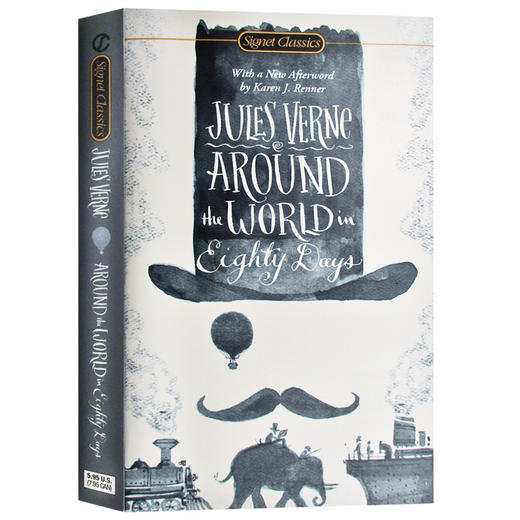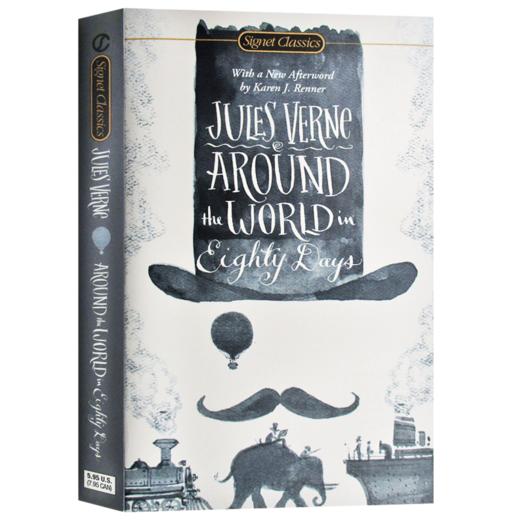八十天环游地球 英文原版小说 Around the World in Eighty Days 环游世界80天 凡尔纳 经典文学世界名著进口英语书籍
| 运费: | ¥ 0.00-999.00 |
| 库存: | 0 件 |
商品详情
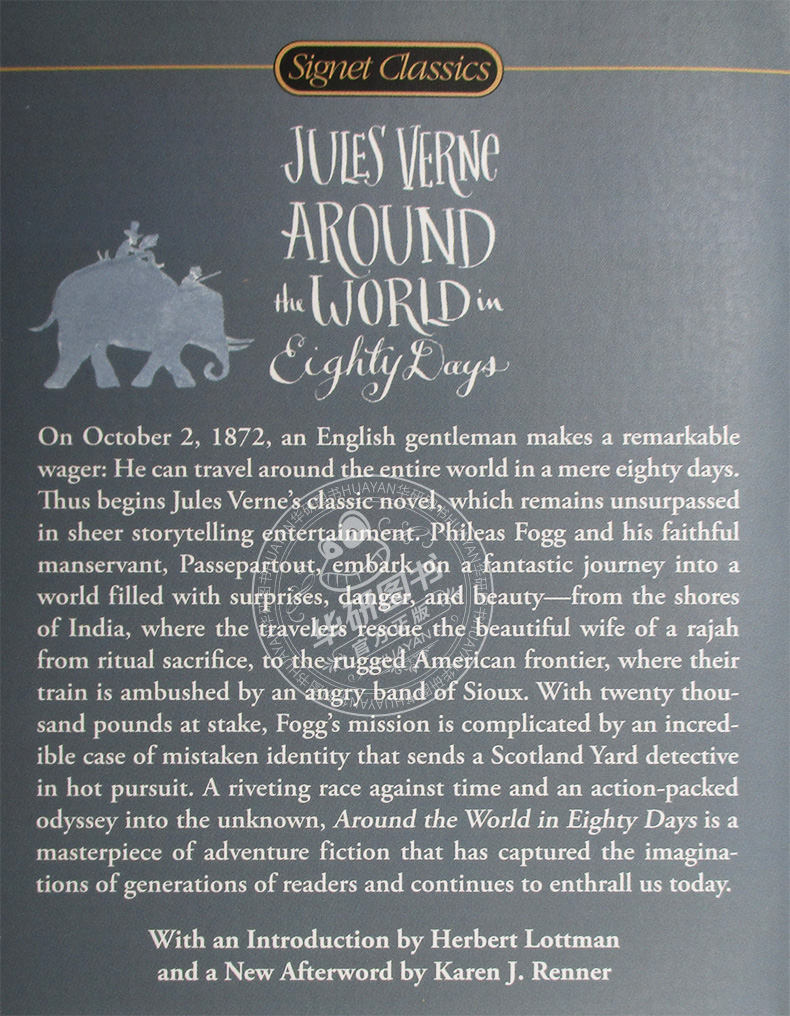
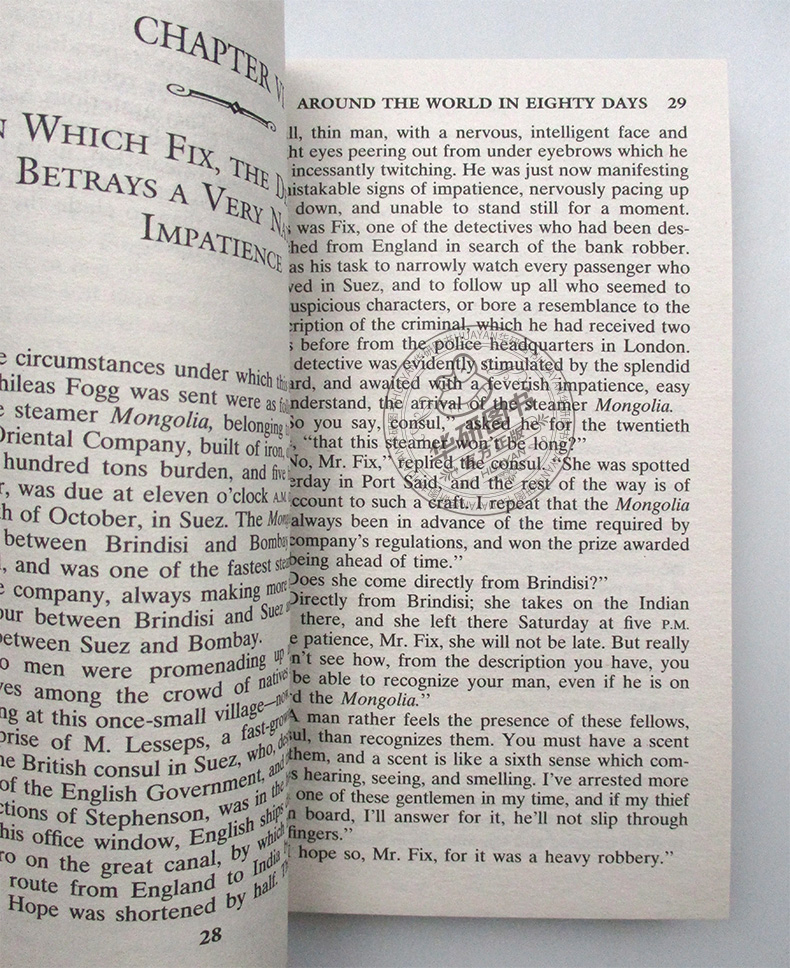
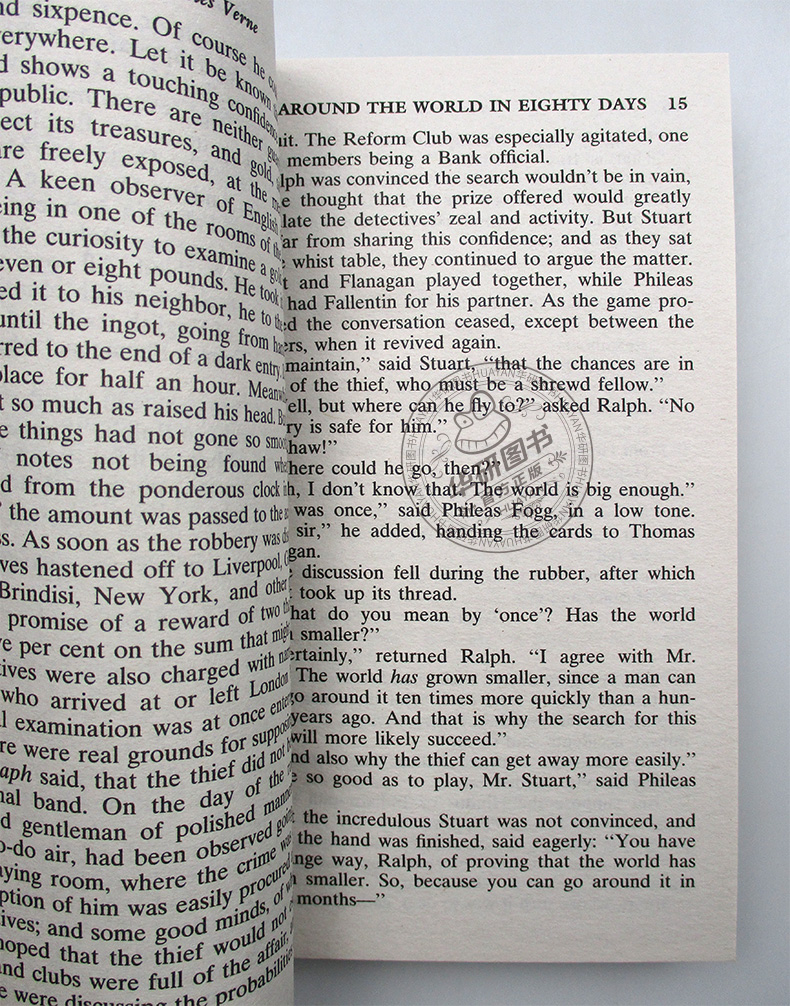
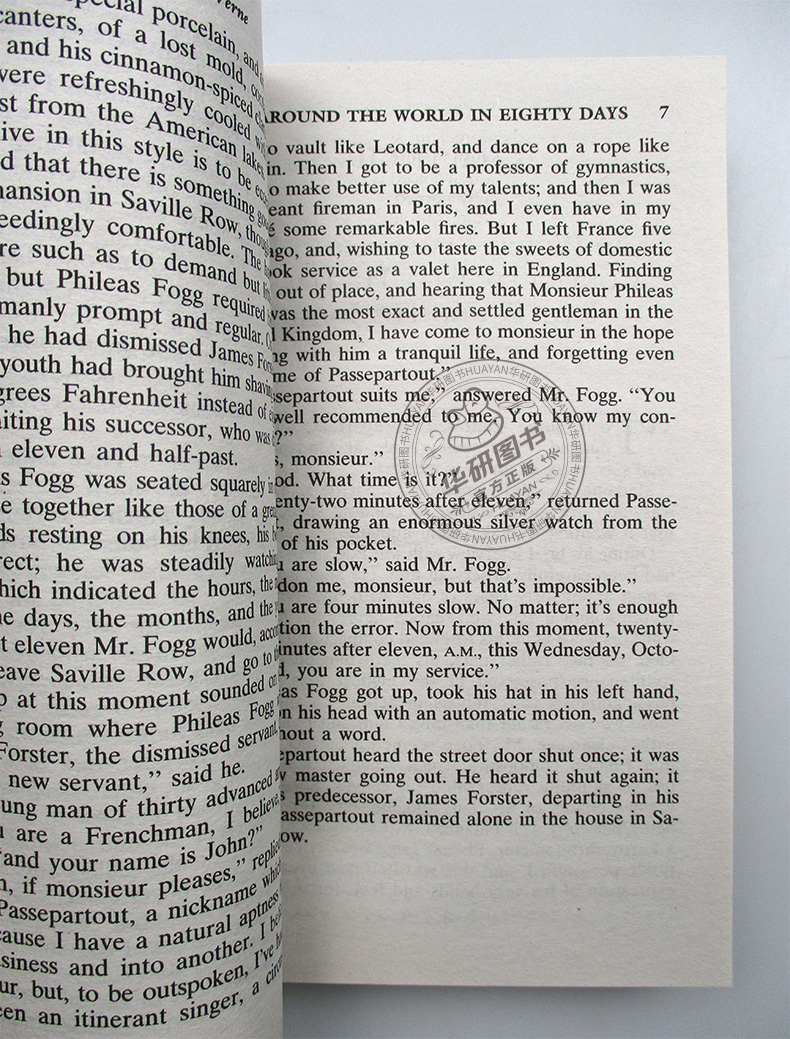
 书名:Around the World in Eighty Days八十天环游地球
书名:Around the World in Eighty Days八十天环游地球
难度:Lexile蓝思阅读指数1090L
作者:Jules Verne儒勒·凡尔纳
出版社名称:Signet Classics
出版时间:2015
语种:英文
ISBN:9780451474285
商品尺寸:10.6 x1.8 x 17.1 cm
包装:简装
页数:256 (以实物为准)
 Around the World in Eighty Days《八十天环游地球》是法国作家儒勒·凡尔纳创作的长篇小说,是其代表作之一。小说起因于英国绅士福格与朋友打的一个赌:要在80天内环游地球一周回到伦敦。随后,他与仆人克服了路途中的艰难险阻,路经地中海、红海、印度洋、太平洋、大西洋,游历印度、新加坡、日本、美国等地,后返回伦敦,一路上福克机智、勇敢,表现出十足的绅士派头。
Around the World in Eighty Days《八十天环游地球》是法国作家儒勒·凡尔纳创作的长篇小说,是其代表作之一。小说起因于英国绅士福格与朋友打的一个赌:要在80天内环游地球一周回到伦敦。随后,他与仆人克服了路途中的艰难险阻,路经地中海、红海、印度洋、太平洋、大西洋,游历印度、新加坡、日本、美国等地,后返回伦敦,一路上福克机智、勇敢,表现出十足的绅士派头。
作者在介绍各地的风土人情和地理知识的同时,还以强烈的正义感和人道主义精神,对各种野蛮、落后、愚昧的社会现状(比如英国鸦片对中国人民的毒害以及美国的武斗选举制度等)进行了批判和鞭挞。
本书为Signet Classics推出的英文原版,由Herbert Lottman 作序,Karen J. Renner写后记。书本小巧便携,内容完整无删减。
Jules Verne’s masterpiece of adventure fiction that has captured the imaginations of generations of readers and continues to enthrall us today.
On October 2, 1872, an English gentleman makes a remarkable wager: He can travel around the entire world in a mere eighty days. Thus begins Jules Verne’s classic novel, which remains unsurpassed in sheer storytelling entertainment. Phileas Fogg and his faithful manservant, Passepartout, embark on a fantastic journey into a world filled with surprises, danger, and beauty—from the shores of India, where the travelers rescue the beautiful wife of a rajah from ritual sacrifice, to the rugged American frontier, where their train is ambushed by an angry band of Sioux. With twenty thousand pounds at stake, Fogg’s mission is complicated by an incredible case of mistaken identity that sends a Scotland Yard detective in hot pursuit in what becomes a riveting race against time and an action-packed odyssey into the unknown.
With an Introduction by Herbert Lottman
and an Afterword by Karen J. Renner
Review
“The reason Verne is still read by millions today is simply that he was one of the best storytellers who ever lived.” —Arthur C. Clarke
 Around the World in Eighty Days《八十天环游地球》
Around the World in Eighty Days《八十天环游地球》
1872年10月2日,菲利亚·福格以巨额赌注同朋友们打了个赌:在80天内环游地球一周。当晚,他就带了法国籍仆人万事通离开伦敦,开始了这次不寻常的旅行。这件事轰动了全国,甚至在股票市场上也出现了福格股票。在福格出发后的第7天,由于出了一桩完全料想不到的事,使福格股票一文不值。原来英国国家银行失窃了一笔巨款,苏格兰侦探费克斯发现福格的特征同警察局调查出来的窃贼的外貌特点一模一样。福格不为挫折所困,经精确计算时间,准时到达苏伊士后,又乘船到达印度,在孟买到加尔各答的途中救下了即将被殉葬的印度年轻寡妇艾娥达。他们搭乘邮船到了香港,而费克斯此时仍没收到警方的拘票。为此,费克斯用鸦片麻醉路路通,企图拖延时间。福格还是赶到了日本,并与路路通在这里不期而遇。而后几经周折,穿越了北美大陆,眼看胜利在望,费克斯却以“女皇政府的名义”逮捕了福格。后因真正的窃贼已于3天前被捕而释放了福格。待福格赶到伦敦,比预定时间迟了5分钟,而后又发现由于是一直向东旅行,无形中赢得一天时间,福格终于获得了胜利,也得到了年轻、美貌、可爱的艾娥达的爱情。
Phileas Fogg was one of those mathematically exact people, who, never hurried and always ready, are economical of their steps and their motions. He never made one stride too many, always going by the shortest route. He did not give an idle look. He did not allow himself a superfluous gesture. When Phileas Fogg wagers a bet that he can travel across the globe in just 80 days, little does he know about the epic journey that he is about to undertake. With his faithful French servant, Passepartout, Phileas Fogg embarks on the adventure of a lifetime, travelling across four continents by whatever means he can— train, elephant, steam ship - and experiencing endless surprises and mishaps along the way.
 儒勒·凡尔纳(Jules Verne),19世纪法国有名的科幻小说和冒险小说作家,被誉为“科学幻想小说之父”。凡尔纳一生著述颇丰,创作的长篇小说和短篇小说集共计六十六部,以及《法国地理》一卷,《伟大的旅行家和伟大的旅行史》六卷。代表作品有《八十天环游地球》《海底两万里》《格兰特船长和他的儿女》《神秘岛》《气球上的五星期》《地心游记》等。
儒勒·凡尔纳(Jules Verne),19世纪法国有名的科幻小说和冒险小说作家,被誉为“科学幻想小说之父”。凡尔纳一生著述颇丰,创作的长篇小说和短篇小说集共计六十六部,以及《法国地理》一卷,《伟大的旅行家和伟大的旅行史》六卷。代表作品有《八十天环游地球》《海底两万里》《格兰特船长和他的儿女》《神秘岛》《气球上的五星期》《地心游记》等。
Jules Verne (1828-1905), born in Nantes, France, was the author of innumerable adventure stories that combined a vivid imagination with a gift for popularizing science. Although he had studied law in Paris, he devoted his life entirely to writing. His most popular stories in addition to Around the World in Eighty Days (1873) include A Journey to the Center of the Earth (1864), Twenty Thousand Leagues Under the Sea (1870), and The Mysterious Island (1874-75), all available in Signet Classics editions. In addition, he was the author of a number of successful plays, as well as a popular history of exploration from Phoenician times to the mid-nineteenth century, The Discovery of the Earth (1878-80). After a long and active career in literature, Jules Verne died at Amiens, France.
Herbert Lottman, a longtime resident of France, was the correspondent for a number of American and British periodicals and literary magazines. Among his twenty-seven books are biographies of Jules Verne, Albert Camus, Colette, and Gustave Flaubert, as well as of The Left Bank: Writers, Artists and Politics from the Popular Front to the Cold War, The Purge (on postwar punishment of Nazi collaborators), and The Fall of Paris: June 1940, all published in both the United States and France.
Karen J. Renner teaches American literature and popular culture at Northern Arizona University. She has published essays on the apocalypse, the Antichrist, horror films, and reality ghost-hunting television shows. She is the editor of The "Evil" Child in Literature, Film and Popular Culture, a collection of essays.
 In the year 1872, the house No.7 Saville Row, Burlington Gardens-the house which Sheridan died, in 1814-was inhabited by Phileas Fogg, Esq., one of the most singular and most noticed members of the reform Club of London, although he seemed to take care todo nothing which might attention.
In the year 1872, the house No.7 Saville Row, Burlington Gardens-the house which Sheridan died, in 1814-was inhabited by Phileas Fogg, Esq., one of the most singular and most noticed members of the reform Club of London, although he seemed to take care todo nothing which might attention.
This Phileas Fogg, then, an enigmatic personage, of whom nothing was known but that he was a very polite man, and one of the most perfect gentlemen of good English society, succeeded one of the great orators that honour England.
An Englishman Phileas Fogg was surely, but perhaps not a Londoner. He was never seen on ‘Change, at the Bank, or in any of the counting-rooms of the “City.” The docks of London had never received a vessel fitted out by Phileas Fogg. This gentlemen did not figure in any public body. His name had never sounded in any Inns of Court, nor in the Temple, nor Lincoln’s Inn, nor Gray’s Inn. He never pleaded in the Court of Chancery, nor the Queen’s Beach, nor the Exchequer, nor the Ecclesiastical Courts. He certainly was not a manufacturer; nor was he a merchant or a gentleman farmer. His name was strange to the scientific and learned societies, and he never was known to take part in the sage deliberations of the Royal Institution or the London Institution, the Artisan’s Association, or the Institution of Arts and Sciences. He belonged, in fact, to none of the numerous societies which swarm in the English capital, from the Harmonic to that of the Entomologists, founded mainly for the purpose of abolishing pernicious insects.
Phileas Fogg was a member of the Reform, and that was all.
The way in which he got admission to this exclusive club was simple enough.
He was recommended by the Barings, with whom he had an open credit. His cheques were regularly paid at sight from his account current, which was always flush.
Was Phileas Fogg rich? Undoubtedly. But those who knew him best could not imagine how he had made his fortune, and Mr. Fogg was the last person to whom to apply for the information. He was not lavish, nor, on the contrary, avaricious; for, whenever he knew that money was needed for a noble, useful, or benevolent purpose, he supplied it quietly and sometimes anonymously. He was, in short, the least communicative of men. He talked very little, and seemed all the more mysterious for his taciturn manner. His daily habits were quite open to observation; but whatever he did was so exactly the same thing that he had always done before, that the wits of the curious were fairly puzzled.
Had he travelled? It was likely, for no one seemed to know the world more familiarly; there was no spot so secluded that he did not appear to have an intimate acquaintance with it. He often corrected, with a few clear words, the thousand conjectures advanced by members of the club as to lost and unheard-of travellers, pointing out the true probabilities, and seeming as if gifted with a sort of second sight, so often did events justify his predictions. He must have travelled everywhere, at least in the spirit.
It was at least certain that Phileas Fogg had not absented himself from London for many years. Those who were honoured by a better acquaintance with him than the rest, declared that nobody could pretend to have ever seen him anywhere else. His sole pastimes were reading the papers and playing whist. He often won at this game, which, as a silent one, harmonised with his nature; but his winnings never went into his purse, being reserved as a fund for his charities. Mr. Fogg played, not to win, but for the sake of playing. The game was in his eyes a contest, a struggle with a difficulty, yet a motionless, unwearying struggle, congenial to his tastes.

- 报佳音
- 主内书籍文创礼品
- 扫描二维码,访问我们的微信店铺

